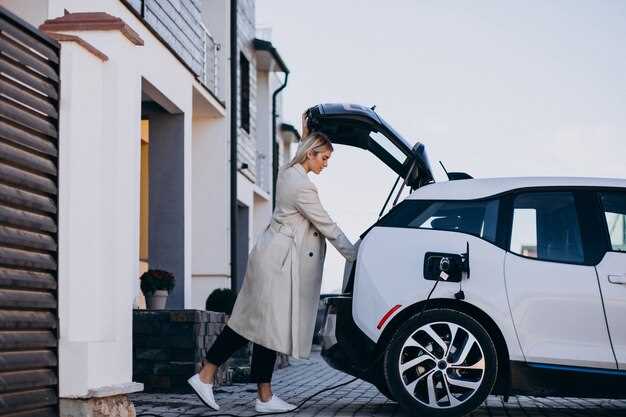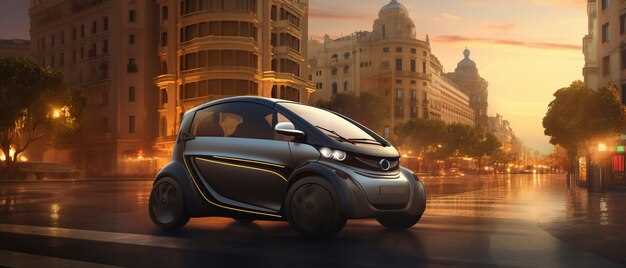For a thrilling drive and sustainable future, set your sights on the electric cars of 2024. Brands are stepping up their game, announcing models that promise cutting-edge technology and unparalleled performance. Whether you’re after a sleek sedan, a spacious SUV, or something sporty, this year has something to excite every driver.
The Tesla Model 3 continues to impress with its long range and quick acceleration. Updates expected this year might include enhanced autopilot features and expanded battery options, catering to tech enthusiasts and eco-conscious consumers alike. It’s a well-rounded choice for anyone looking to transition to electric.
If versatility is your priority, consider the Ford Mustang Mach-E. This SUV combines style with practicality, offering ample cargo space and an engaging driving experience. Look for further improvements in technology integration that will make your travels even more enjoyable.
Don’t overlook the Hyundai Ioniq 6, which is gaining popularity for its striking design and impressive efficiency. Its aerodynamic shape not only turns heads but also optimizes range, making it a strong competitor in the electric market. Anticipate is its advanced safety features that will soon become standard.
Lastly, the BMW i4 stands out for those who appreciate luxury in an electric vehicle. This model is designed with a performance-oriented mindset, catering to driving enthusiasts while maintaining zero emissions. Keep an eye out for its agile handling and advanced tech options that enhance the driving experience.
Best New Models Launching in 2024
The 2024 electric vehicle lineup features exciting new models that stand out in performance and innovation. First up, the Tesla Model 2 aims to redefine affordability in electric cars. With an estimated starting price around $25,000, it promises impressive range and cutting-edge technology, making electric driving accessible to a broader audience.
Ford’s F-150 Lightning receives a refresh this year, boasting enhanced battery options for more power and improved towing capacity. The additional features include advanced driver-assistance systems, making this electric truck a formidable contender in the pickup market.
Chevrolet Equinox EV enters 2024 with a spacious interior and a range of about 300 miles on a single charge. Its combination of practicality and modern design caters to families looking for an electric option without compromising on space and comfort.
Another noteworthy model is the Hyundai Ioniq 7. Set to launch with a sleek design and advanced tech interfaces, this electric SUV offers versatility and a robust battery system, appealing to adventure enthusiasts and urban drivers alike. Expect smart charging solutions and an enhanced user experience.
Kia EV5 aims to captivate with its stylish aesthetics and solid performance metrics. This mid-size crossover focuses on comfort and utility while providing a competitive driving range, making it an attractive option for both city and highway use.
Lastly, keep an eye on the Porsche Macan EV, designed to combine luxury with electric performance. With quick acceleration and meticulous attention to detail, it redefines what a sports SUV can be, catering to drivers seeking both thrill and sophistication.
These models not only demonstrate manufacturers’ commitment to sustainability but also deliver features and performance that cater to a wide variety of preferences and needs. 2024 sets the stage for electric vehicles to blend seamlessly into daily life.
Innovative Technology Features to Expect
Expect advanced battery management systems that enhance efficiency and longevity. These systems will monitor individual cell performance, adjusting charging and discharging processes to extend battery life significantly. Additionally, manufacturers are integrating solid-state batteries, offering higher energy density and faster charging times compared to traditional lithium-ion options.
Next, look for over-the-air (OTA) updates that keep your vehicle’s software up to date with the latest features and performance improvements. This capability not only enhances functionalities but also addresses bugs without requiring a dealership visit, providing a seamless ownership experience.
Innovative driver assistance technologies will take center stage. Expect adaptive cruise control that uses real-time data to adjust speed based on traffic conditions, enhancing safety and reducing driver fatigue. Lane-keeping assistance will also evolve, featuring more responsive systems that actually guide the vehicle within lane markings rather than merely providing alerts.
Interior designs will incorporate augmented reality for navigation, projecting directions directly onto the windshield. This feature promises to enhance situational awareness, allowing drivers to keep their attention on the road while receiving navigational guidance. Voice control will become more intuitive, enabling natural-language commands for various vehicle functions.
Charging networks are set to expand dramatically, with ultra-fast charging stations becoming more prevalent. Expect to see capabilities for charging at rates exceeding 350 kW, which can significantly reduce downtime during long trips. Some manufacturers will offer flexible charging solutions, allowing you to charge from standard household outlets when necessary.
Finally, sustainability will define future models, with many brands focusing on eco-friendly materials in vehicle interiors. Expect recycled plastics, plant-based upholstery, and sustainable sourcing to enhance the overall appeal of electric vehicles without compromising luxury or comfort.
Comparative Range and Performance Metrics
Consider the Tesla Model 3 Long Range, boasting a range of approximately 358 miles on a single charge. With a 0-60 mph time of just 4.2 seconds, it offers a blend of impressive performance and efficiency. Next up is the Ford Mustang Mach-E, which provides around 312 miles of range while delivering a sporty performance, reaching 60 mph in 5.2 seconds. This model stands out for its engaging driving dynamics.
The Hyundai Ioniq 5 makes its mark with a robust 303-mile range and a quick 0-60 mph time of 5.0 seconds, appealing to those seeking both comfort and agility. Just behind, the Kia EV6 offers a competitive range of 310 miles alongside a thrilling 0-60 mph in approximately 3.5 seconds, reinforcing its sporty character.
Next, the Rivian R1T, designed for adventure seekers, delivers an impressive range of around 314 miles. With a 0-60 mph time of just 3 seconds, it combines rugged capabilities with exhilarating acceleration. Similarly, the Lucid Air dominates with a staggering 520 miles of estimated range, and incredible performance, accelerating from 0 to 60 mph in just 2.5 seconds–setting a benchmark for electric luxury sedans.
Lastly, the BMW i4 punches above its weight with a range of 300 miles and a speedy 0-60 mph in 4.0 seconds, appealing to both efficiency-aware drivers and performance enthusiasts. Each of these vehicles showcases unique strengths in both range and performance, catering to different preferences and lifestyles.
Pricing Trends and Budget-Friendly Options
In 2024, the electric car market shows a strong trend toward affordability. Brands are actively reducing prices across their electric models, making it easier for consumers to transition to electric vehicles. For example, the Tesla Model 3 has seen price cuts, bringing it closer to the $35,000 mark, while the Ford Mustang Mach-E now offers competitive pricing options that attract budget-conscious buyers.
Leasing is becoming a popular choice, enabling drivers to enjoy electric vehicles at lower upfront costs. Many manufacturers now offer attractive lease deals, which can make monthly payments more manageable and include incentives such as maintenance packages. This approach allows drivers to access the latest technology without committing to a high purchase price.
On the budget-friendly side, brands like Nissan with its Leaf and Chevrolet with the Bolt EV are leading the charge by offering models priced under $30,000. These vehicles not only provide affordability but also deliver decent ranges suitable for everyday use. As charging infrastructure expands, these options appeal to urban drivers looking for efficient commuting solutions.
Government incentives also play a role in reducing the cost of electric vehicles. Many regions offer substantial tax credits and rebates which can significantly lower the net price of an electric car. Research local and federal programs to maximize potential savings when considering a purchase.
As new brands enter the market, competition intensifies, leading to more budget-friendly models. Keep an eye on upcoming releases from companies like Hyundai and Kia as they introduce affordable electric options, promising great value without sacrificing quality.
In summary, affordability in electric cars is on the rise, driven by competitive pricing, attractive leasing options, and government incentives. Consumers have more choices than ever, enabling a smooth transition to electric driving while staying within budget.
Charging Infrastructure Developments
Investing in fast-charging stations represents a strategic move for enhancing the electric vehicle experience. Companies like ChargePoint plan to expand their networks significantly by adding thousands of new fast chargers across urban areas and along highways. This expansion will likely reduce charging times to 10-30 minutes, making electric car use more convenient for longer trips.
Public-private partnerships are becoming a common approach to boost charging infrastructure. Collaborations between local governments and private firms enable the installation of charging points in high-traffic areas, such as shopping centers and parking garages. These initiatives not only improve accessibility but also promote the transition to electric vehicles.
Technological advancements, such as ultra-fast charging, will gain traction in 2024. Manufacturers are developing chargers that can deliver up to 350 kW, enabling vehicles to recharge significantly faster than traditional options. Implementing this technology in both public and home settings will enhance user convenience and reduce range anxiety.
Wireless charging technology is also making headway. Companies are testing systems that allow vehicles to charge automatically when parked over designated charging pads. This innovation could simplify the charging process and increase the attractiveness of electric cars for new users.
The integration of renewable energy sources into charging stations is an upcoming trend. Solar-powered charging stations not only ensure cleaner energy use but also reduce electricity costs. This shift will appeal to environmentally conscious consumers and support sustainability in the automotive market.
Finally, managing charging through smart-grid technologies becomes more relevant. These systems can optimize energy distribution, taking into account peak times and user demands. This ensures that electric vehicle owners can charge their cars when it’s most efficient and cost-effective.
Market Predictions and Consumer Preferences
In 2024, electric vehicle (EV) sales are projected to rise significantly, with estimates suggesting a 35% increase compared to previous years. Analysts predict that government incentives and expanding charging infrastructure will drive this growth.
Consumer preferences are shifting toward sustainability and innovative technology. According to surveys, 60% of potential buyers prioritize eco-friendly options and regard EVs as essential for reducing their carbon footprint.
Key features that consumers desire include:
- Longer battery life – A range exceeding 300 miles remains a top requirement.
- Fast charging capabilities – Consumers prefer models that offer convenient charging solutions, ideally reaching 80% charge within 30 minutes.
- Advanced driver-assistance systems (ADAS) – Many buyers actively seek vehicles equipped with cutting-edge safety technology.
- Affordability – While technology advances, price remains a decisive factor. Budget-friendly models are gaining traction in the market.
As more manufacturers enter the electric car market, competition will drive innovation and keep prices in check. Upcoming models from well-established brands and newcomers will offer more choices, enhancing consumer appetite.
Additionally, subscription services and flexible leasing options will appeal to younger consumers, allowing them to access EVs without the burdens of ownership. Expect a growing trend toward eco-friendly transportation solutions that align with modern lifestyles.
Brands that understand and adapt to these changing preferences will likely secure a larger market share. Stay attuned to these developments to make informed decisions in the evolving landscape of electric vehicles.







